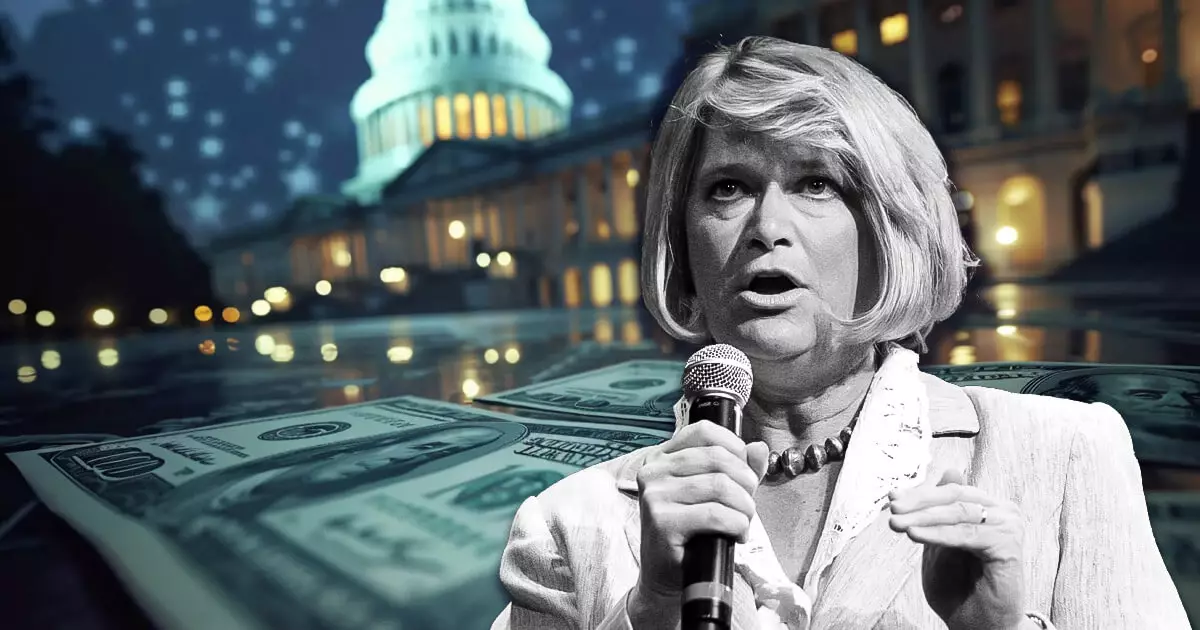The recent confirmation of Michelle “Miki” Bowman as the Vice Chair for Supervision at the Federal Reserve marks a watershed moment in the evolution of digital asset regulation in the United States. Senator Cynthia Lummis, an unwavering proponent of cryptocurrency, heralded Bowman’s ascent as a potential catalyst for a transformative era in banking and finance. This pivotal change, passed in a narrow 48-46 vote by the Senate, fills a crucial vacancy left by Michael Barr and signifies a commitment to embrace an era where cryptocurrencies can thrive amid regulatory frameworks that favor innovation.
Bowman’s previous tenure as a Fed Governor since 2018 positions her well to make informed decisions. She has demonstrated an insightful understanding of both traditional banking and the burgeoning landscape of fintech. This background provides a foundation for her to navigate the complexities of overseeing the central bank’s supervisory responsibilities in relation to both established financial institutions and the increasingly influential digital asset industry.
Championing Innovation Over Politics
While Bowman steps into her position at a time when regulatory scrutiny of digital assets is intense, it is her commitment to evidence-based regulation that gives cause for optimism. Lummis articulated this sentiment when she emphasized that Bowman’s objective perspective will augment the U.S. financial system’s resilience. Unlike many of her predecessors who have often succumbed to the politically charged atmosphere surrounding crypto, Bowman appears poised to prioritize practical regulatory measures that do not stifle innovation.
In her nomination hearing before the Senate Banking Committee, she articulated a compelling argument for allowing U.S. banks to leverage new technologies. Her call for “sensible innovation” signifies that she understands the landscape’s urgency and potential. The imperative cannot be overstated: without the capability to adapt and harness new technologies, American banks risk falling behind their global counterparts, crippling the nation’s competitive advantage in the financial sector.
The Ripple Effect on Regulatory Frameworks
The Federal Reserve’s evolving stance toward digital assets cannot be overstated, as it will influence the broader banking sector’s engagement with crypto firms and stablecoin providers. Although the central bank does not directly regulate digital currencies, its decisions ripple through the financial landscape, impacting bank participation in cryptocurrencies, custodial services, and settlement procedures.
Industry stakeholders have greeted Bowman’s confirmation with palpable enthusiasm. Trade organizations such as the Crypto Council for Innovation have supported her nomination, recognizing her track record in community banking and her forward-thinking approach to financial technology. As a result, expectations are high that under her supervision, the Federal Reserve will cultivate an environment conducive to growth and clarity.
The Legislative Landscape Ahead
Bowman’s entry into leadership arrives precisely when Congress is grappling with a slew of bills aimed at addressing significant regulatory shortcomings in the crypto sector. The approaches to stablecoins, digital asset market structures, and custodial services are up for debate, and Bowman’s influence could play a crucial role in shaping these policies. Should she successfully advocate for a well-structured regulatory framework, it would alleviate uncertainty for crypto entrepreneurs and investors alike, promoting a more stable financial ecosystem.
This moment of transformation is not without challenges. The cryptocurrency industry has faced relentless opposition from certain lawmakers and regulatory bodies resistant to digital asset adoption. Yet, in this atmosphere of resistance, Bowman’s focus on embracing emerging technologies could foster a more open dialogue between regulators and the innovative minds driving the crypto revolution.
A Brighter Future for Crypto?
As Bowman embarks on her four-year term, her leadership represents a beacon of hope for crypto advocates, who long for a world where digital assets are fully integrated into the mainstream economy. Her ability to champion sensible policies that support financial innovation while maintaining necessary regulations could redefine the contours of the American financial landscape.
In an age marked by unparalleled technological advancement and shifting cultural attitudes toward finance, the path that Vice Chair Bowman carves out in her new role could not only reshape the U.S.’s approach to digital assets but serve as a model for other nations grappling with similar challenges. This pivotal time provides both risks and opportunities, as a thoughtfully navigated regulatory environment could establish the United States as a leader in harnessing the power of decentralized finance.


Leave a Reply